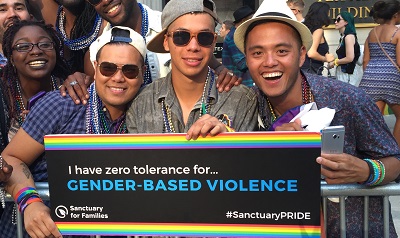Intern Adaiya Granberry asked men at Sanctuary how they strive to be allies and feminists.
Dear Feminist Men and Male-Identified Folks,
As a woman living in a country of systematic male supremacy and socialized male dominance, the feminist movement is relevant to me. When women’s inequality is sexualized, women’s pain is profited from, women’s bodies are dehumanized, and women’s lives are taken away, I get angry. That is my motivation for interning this summer at Sanctuary for Families.
Yet, as a developing feminist, I push myself to ask how I can involve myself in other movements that I don’t, at least on the surface, identify with. I recognize that the overarching systems of power perpetuate all of the inequalities within our society today, not just for women, but for the people of color, immigrants, the LGBTQIA community, and the poor.
Our struggles are, in my belief, inextricable because we are all the “othered.”
At Sanctuary, I am motivated everyday by the passion of those around me. This organization is dedicated to fighting against gender-based violence, and through that, fights against the institutionalized beliefs that women’s bodies are not their own.
I find it inspiring that the large majority of employees are women. We fight this fight because we live this life. We can easily relate to the experiences of our clients because we can see ourselves on the other side. We very well may have been on that side at another time in our lives.
But what about the men? And yes, they do exist at Sanctuary, but my question to these feminist men is, why? Why do you care? What motivates you? How do men involve themselves in a fight that may seemingly not affect them?
Who better to answer these questions than the men of Sanctuary themselves?
When considering how we can reshape power relationships in society, we cannot simply exclude men (no matter how much we want to.) “Men’s voices, unfortunately, are still necessary,” says Archil Sakhiashvili, an Administrative Associate in our Clinical Department.
I have to agree with Archil. In any social justice fight, the truth is that we need allies and we can’t do it by ourselves.
As an ally, it is crucial to know your role—know your boundaries, know your place, and don’t violate that line. As Mark Yrigoyen, the Director of DVIEP, says, a man’s role is “to listen for ways to assist.”
Men, as allies in this fight, you must do your part by first understanding what is needed from you. If you jump to conclusions about what needs to be done, you are taking up space and exercising your own male privilege. “It’s not a crusade, but an everyday thing,” Mark continues.
Kyle Dandelet, a Senior Staff Attorney in our Immigration Intervention Project, says men must do their part by “try[ing] to influence other men’s actions and expectations within their own spheres.” A key role men can play is leading conversation and introducing issues of gender violence into male-dominated spaces.
In these arenas, feminist men, it is your job, as an ally to women, to be an advocate. This is where you can, and should, exploit your space of privilege to take a stand against gender violence. We need men to take the opportunities to speak up where women cannot.
Lastly, I spoke with one of my supervisors, John Wyeth, the Director of Institutional Giving. “Men and boys must be self-reflective and conscious of the ways [we] act,” says John. Some may be “perpetuating abusive behavior” and this “becomes normalized and the fabric of [our] community.”
Men need to educate themselves. Men need to be cognizant of their own acts of violence and teach their sons and nephews and grandchildren the same. Men need to listen to women’s needs, and follow suit, because in this fight, our voices, thoughts, and ideas come first.
Men, you must understand why women are fighting gender violence, inform yourself about the too commonly shared experiences of women, and bring our words to the forums only you have access to—because as John says, “domestic violence and gender violence are not just women’s issues…they absolutely affect all of us.”
Yours Truly,
Adaiya
Adaiya Granberry is a summer intern at Sanctuary for Families. She comes to Sanctuary through Duke University’s Moxie Project.
